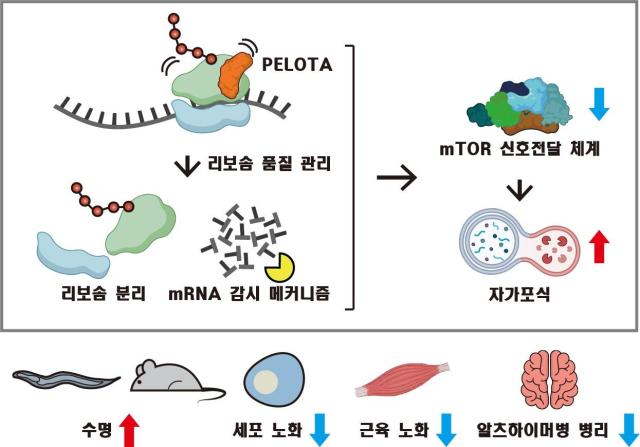
SEOUL, August 18 (AJP) - A joint research team from the Korea Advanced Institute of Science & Technology (KAIST), Yonsei University, and the Korea Research Institute of Bioscience and Biotechnology (KRIBB) has identified a key protein that regulates the pace of aging by maintaining the quality of ribonucleic acid (RNA). The discovery points to a potential new strategy for treating age-related diseases such as Alzheimer's.
The researchers found that a ribosome quality-control protein called PELOTA plays a central role in removing faulty messenger RNAs (mRNAs). While the link between aging and the quality of DNA and proteins has been studied extensively, the role of RNA quality control remained largely unknown. The team demonstrated for the first time that ribosome-based mRNA surveillance directly influences lifespan.
Using the nematode Caenorhabditis elegans, a widely used model for aging research, the researchers showed that overexpressing PELOTA extended lifespan. Without PELOTA, the animals aged faster. The study revealed that ribosome quality control, mediated by PELOTA, is essential for eliminating abnormal mRNAs that can disrupt cellular balance.
The study also revealed how PELOTA connects with major cellular pathways. When PELOTA was deficient, the mammalian target of rapamycin (mTOR) signaling pathway became abnormally active, and autophagy, the cell's self-cleaning and recycling process, was suppressed, accelerating aging. By contrast, activating PELOTA helped inhibit mTOR, promote autophagy, and preserve cellular homeostasis.
Importantly, the findings were not limited to worms. The team observed similar mechanisms in mice and human cells, suggesting that PELOTA function is evolutionarily conserved. The loss of PELOTA activity was linked to muscle aging and Alzheimer's disease-like pathologies, pointing to potential therapeutic applications.
"This study provides strong molecular evidence that RNA quality control is a central part of the aging regulatory network," said Lee Seung-jae of KAIST's Department of Biological Sciences, who led the work. "Our results show that removing abnormal RNAs is critical for maintaining cellular balance and delaying aging."
The collaboration was co-led by Seo Jin-su of Yonsei University and Lee Kwang-pyo of KRIBB. The paper, titled Pelota-mediated ribosome-associated quality control counteracts aging and age-associated pathologies across species, was published on August 4 in the journal Proceedings of the National Academy of Sciences (PNAS).
Doctoral researchers Lee Jong-seon and Kim Eun-ji of KAIST, Lee Bo-ra of KRIBB, and Lee Hye-in of Yonsei University were credited as co-first authors. The project was supported by the National Research Foundation of Korea's Leader Research Program.
Copyright ⓒ Aju Press All rights reserved.




